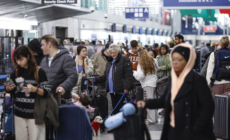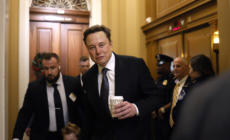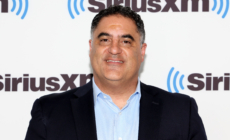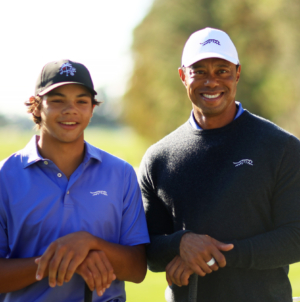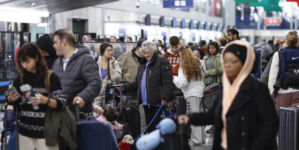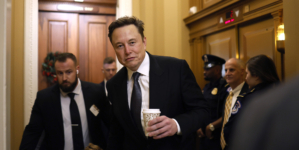-
Possible rain, high surf forecast for Los Angeles area in holiday week - 16 mins ago
-
Tiger Woods Son Charlie Hits Epic Hole in One While Playing Alongside Father - 29 mins ago
-
Trump Picks a Former Treasury Official as His Top Economist - 35 mins ago
-
Winter Weather: ‘Trouble Spots’ Across US as Millions Travel for Christmas - about 1 hour ago
-
Woman Dies After Being Set on Fire in Subway Car, Police Say - about 1 hour ago
-
Republican Says Elon Musk Feels Like ‘Our Prime Minister’ - 2 hours ago
-
What Kennedy’s Approach to Addiction Gets Wrong - 2 hours ago
-
Titans Make Decision on Starting Quarterback For Week 16 - 2 hours ago
-
Germany Searches for Motives in Christmas Market Attack - 3 hours ago
-
Dodgers Reportedly Pursuing Blockbuster Trade For Cubs’ Seiya Suzuki - 3 hours ago
Kremlin Treads Carefully After Moscow Attack Over Fears of Ethnic Strife
At a memorial service this week outside the concert hall where Islamist extremists are suspected of carrying out a deadly terrorist attack, one of Russia’s most popular pro-Kremlin rappers warned “right-wing and far-right groups” that they must not “incite ethnic hatred.”
At a televised meeting about the attack, Russia’s top prosecutor, Igor Krasnov, pledged that his service was paying “special attention” to preventing “interethnic and interfaith conflicts.”
And when President Vladimir V. Putin made his first comments on the tragedy last weekend, he said he would not allow anyone to “sow the poisonous seeds of hatred, panic and discord in our multiethnic society.”
In the wake of the assault near Moscow that killed 139 people last Friday, there has been a recurring theme in the Kremlin’s response: a fear that the tragedy could spur ethnic strife inside Russia. While Mr. Putin and his security chiefs are accusing Ukraine — without evidence — of having helped organize the killing, the fact that the four detained suspects in the attack are from the predominantly Muslim Central Asian country of Tajikistan is stoking anti-migrant rhetoric online.
For Mr. Putin, the problem is magnified by the competing priorities of his war in Ukraine. Members of Muslim minority groups make up a significant share of the Russian soldiers fighting and dying. Migrants from Central Asia are providing much of the labor that keeps Russia’s economy running and its military supply chain humming.
But many of the most fervent supporters of Mr. Putin’s invasion are Russian nationalists whose popular, pro-war blogs on the Telegram messaging app have brimmed with xenophobia in the days since the attack.
“The borders have to be shut down as much as possible, if not closed,” said one. “The situation now has shown that Russian society is on the brink.”
As a result, the Kremlin is walking a fine line, trying to keep war supporters happy by promising tougher action against migrants while trying to prevent tensions from flaring across society. The potential for violence was highlighted in October, when an antisemitic mob stormed an airport in the predominantly Muslim Russian region of Dagestan to confront a passenger plane arriving from Israel.
“The authorities see this as a very big, serious threat,” Sergey Markov, a pro-Putin political analyst in Moscow and a former Kremlin adviser, said in a phone interview. “That’s why all efforts are being made now to calm down public opinion.”
Caught in the middle are millions of migrant workers and ethnic-minority Russians who are already facing an increase on city streets in the kind of racial profiling that was commonplace even before the attack. Svetlana Gannushkina, a longtime Russian human rights defender, said on Tuesday that she was scrambling to try to help a Tajik man who had just been detained because the police “are looking for Tajiks” and “saw a person with such an appearance.”
“They need migrants as cannon fodder” for the Russian Army “and as labor,” Ms. Gannushkina said in a phone interview from Moscow. “And when they need to fulfill the plan on fighting terrorism, they’ll also focus on this group” of Tajiks, she said.
Nearly a million citizens of Tajikistan, which has a population of about 10 million, were registered in Russia as migrant workers last year, according to government statistics. They are among the millions of migrant laborers in Russia from across the former Soviet republics of Central Asia, a driving force in Russia’s economy, from food delivery and construction to factory work.
A manager of a food business in Moscow that employs Tajiks said in an interview that the mood in the Russian capital reminded her of the 2000s, when Muslims from the Caucasus region faced widespread discrimination in the wake of terrorist attacks and the wars in Chechnya. Tajiks in Moscow are so apprehensive they are hardly going outside at all, she said, requesting anonymity because she feared repercussions for speaking to a Western journalist.
“There’s already no supply of labor because of the S.V.O.,” she added, using the common Russian abbreviation for the Kremlin’s “special military operation” against Ukraine. “And now it’ll be even worse.”
Ethnic tensions have been an enduring challenge for Mr. Putin during his almost quarter-century rule, but he has also tried to use them to his geopolitical advantage. Mr. Putin’s rise to power was shaped by war in the southern, predominantly Muslim region of Chechnya, where Russia sought to brutally extinguish separatist and extremist movements. He has also helped foment separatism in places like the Georgian regions of South Ossetia and Abkhazia, taking sides in long-simmering conflicts there to expand Russia’s influence.
Mr. Putin’s government is already trying to show the public that it stands ready to take action against migrants. A top lawmaker proposed on Tuesday that firearms sales be banned to newly naturalized Russian citizens. Mr. Krasnov, the top prosecutor, said that the number of crimes carried out by migrants rose by 75 percent in 2023, without providing specific details. “We need to develop balanced solutions based on the need to ensure the safety of citizens and the economic expediency of using foreign labor,” he added.
Far from trying to keep foreigners out, Russia has made it easier for migrants to become Russian citizens since the start of its full-scale invasion of Ukraine in February 2022. A primary reason appears to be the military’s need for soldiers in Ukraine, and police raids targeting migrant workers to compel them to register for military service have become commonplace in Russian news reports.
As a result, Tajik migrants in Moscow now fear not only deportation, but also the possibility that they could be pressed into service in Ukraine, said Saidanvar, 25, a Tajik human rights activist who recently left Moscow. He asked that his last name not be used for security reasons.
“Tajiks are really afraid,” he said in an interview, “that the Russian authorities will start sending Tajiks to the front en masse to fight as a sort of revenge against our Tajik people.”
In his speeches on the war, Mr. Putin has paid frequent lip service to Russia as a multiethnic state — a legacy of the Russian and Soviet empires. In March 2022, after describing the heroism of a soldier from Dagestan, Mr. Putin enumerated some of Russia’s ethnic groups by saying: “I am a Lak, I am a Dagestani, I am a Chechen, an Ingush, a Russian, a Tatar, a Jew, a Mordvin, an Ossetian.”
In his rhetoric about his conflict with the West, Mr. Putin has frequently accused Russia’s adversaries of trying to stir up ethnic strife in Russia. That was his response to the Dagestan airport riot in October, which he baselessly blamed on Western intelligence agencies and Ukraine.
That is also increasingly at the center of his response to Friday’s terrorist attack, which the Islamic State claimed responsibility for and American officials say was carried out by a branch of the extremist group. On Tuesday, the head of Russia’s domestic intelligence agency claimed that Ukrainian, British and American spies might have been behind it.
The upshot appears to be that the Kremlin is seeking to refocus anger over the attack toward Ukraine while trying to show the public that it is taking concerns about migration into account.
“They’re going to grab the Tajiks and blame the Ukrainians,” Ms. Gannushkina, the human rights defender, said. “It was clear from the very beginning.”
Still, Mr. Markov, the pro-Kremlin analyst, said he saw tensions over migration policy even inside Mr. Putin’s powerful security establishment. Anti-immigrant law enforcement and intelligence officials, he said, were at odds with a military-industrial complex that needs migrant labor.
“It’s a contradiction,” he said. “And this terror attack has sharply aggravated this problem.”





